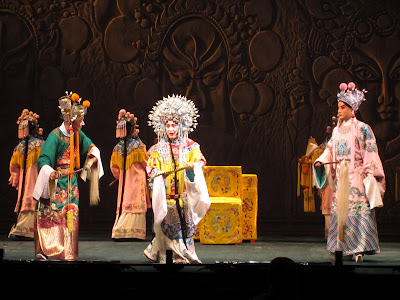I really enjoyed the music from the traditional Chinese instruments. It was very distinct from Western orchestral works. You can hear the pentatonic (5-note) scale, which is what "makes it sound Chinese." This stands in contrast to the heptatonic (7-note) scale that we are more accustomed to hearing. I also enjoyed the elaborate costumes and the acting, which can be seen in the pictures below. However, the singing did not quite suit my taste. Beijing opera's Chinese is a special dialect similar to the Anhui and Hubei dialects from which this musical and artistic style developed. Also, the high-pitched and "whiny" voices just sounded really strange and foreign to me.
 |
| Musician playing the erhu (二胡) |
Before the show:
 |
| Musician playing the guzheng (古筝) |
 |
| A performer painting his own face before the show |
First performance:
There is an emperor who has been surrounded by his enemies, and his favorite concubine does a final dance for him with swords and tears before committing suicide.
Second performance:
A Chinese general (white clothes) is traveling, and staying in an inn along the way. However, the innkeeper (black clothes) is suspicious of him, and he is equally suspicious of the innkeeper. So, a fight breaks out in the pitch-black night. It's actually pretty comical because they pretend they cannot see each other, oftentimes purposely coming really close to each other, but without any contact.
Third performance:
I actually forgot what this one was about, maybe it's the start of what I think is the 4th performance? All I remember is that the guy wore a really awesome hat with two huge antennae!
Fourth performance:
This is the story of a concubine whose emperor has gone to the West Palace. To soothe herself, she drinks a lot of wine and gets drunk. I think it was supposed to be funny -- and the acting was -- but I'm pretty sure at least a few of the jokes went over my head.
At the end:
 |
| Group picture! |












































